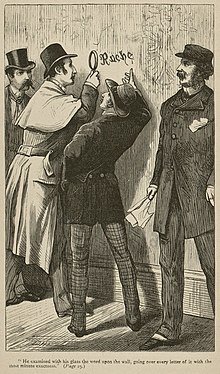
Back Dwaalspoor Afrikaans الرنجة الحمراء Arabic Чырвоная сялёдка Byelorussian Pista falsa Catalan Red Herring (Redewendung) German Red herring Greek Red herring Spanish نکته انحرافی Persian Harhaanjohtava vihje Finnish Hareng rouge French

A red herring is something that misleads or distracts from a relevant or important question.[1] It may be either a logical fallacy or a literary device that leads readers or audiences toward a false conclusion. A red herring may be used intentionally, as in mystery fiction or as part of rhetorical strategies (e.g., in politics), or may be used in argumentation inadvertently.[2]
The term was popularized in 1807 by English polemicist William Cobbett, who told a story of having used a strong-smelling smoked fish to divert and distract hounds from chasing a rabbit.[3]
- ^ "red herring, n." Oxford English Dictionary. OED Third Edition, September 2009. Archived from the original on 24 September 2015.
- ^ Red-Herring (15 May 2019). "Red Herring". txstate.edu. Retrieved 31 August 2021.
- ^ Dupriez, Bernard Marie (1991). A Dictionary of Literary Devices: Gradus, A–Z. University of Toronto Press. ISBN 978-0-8020-6803-3.
© MMXXIII Rich X Search. We shall prevail. All rights reserved. Rich X Search